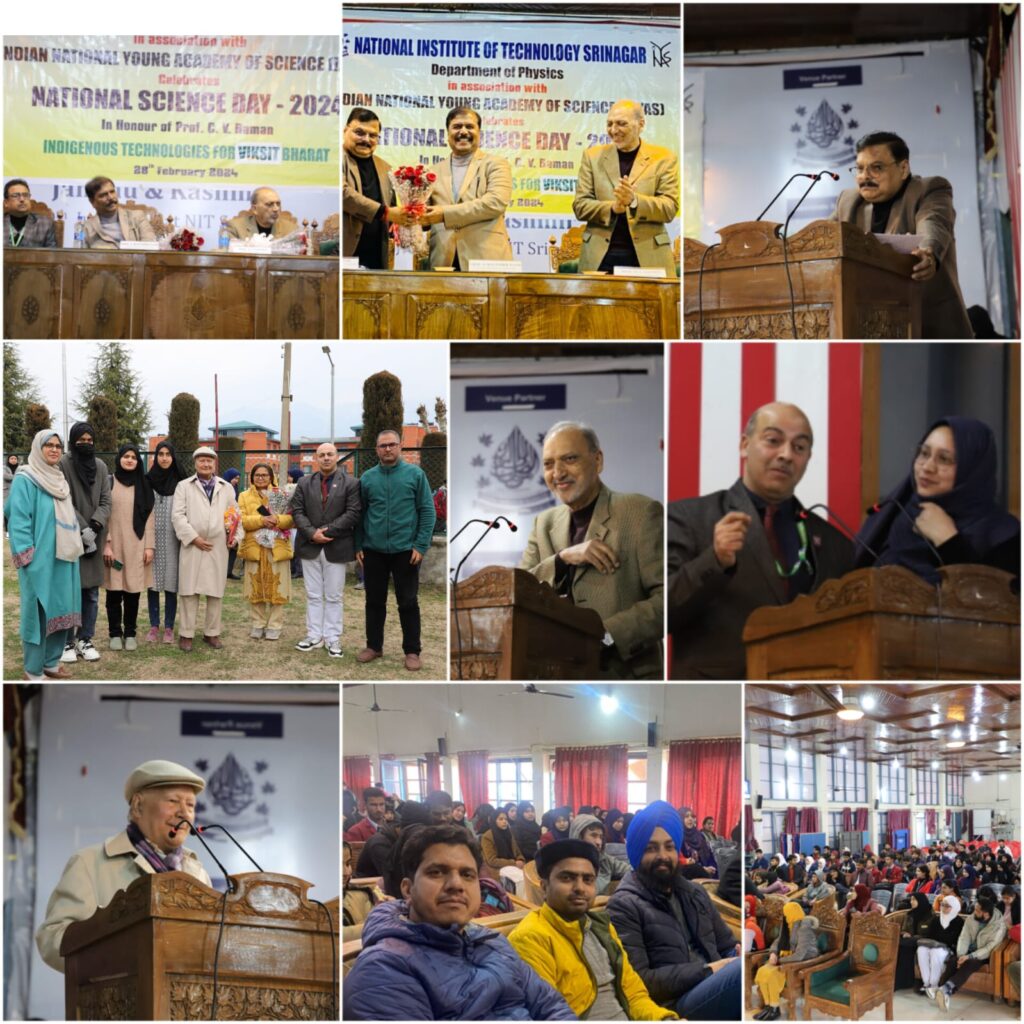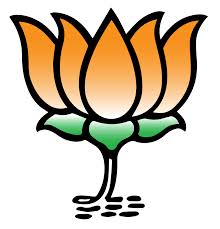NIT Srinagar celebrates National Science Day 2024
J&K leads as the first region in the country to implement NEP 2020: Principal Sec Higher Education
Foster scientific temper; excel in AI, Nanotech, robotics, and geosciences
Kashmir has been a seat of learning for centuries, now it is time to make it centre of innovations: Director NIT Srinagar

Srinagar, Feb 28: The Department of Physics, National Institute of Technology (NIT) Srinagar, in collaboration with Indian National Young Academy of Science (INYAS), celebrated National Science Day 2024 on Wednesday, honoring the remarkable contributions of Prof. CV Raman, renowned for his discovery of the ‘Raman Effect.’
The event was presided over by Alok Kumar (IRS), Principal Secretary to Government, Higher Education Department J&K. Director NIT Srinagar Prof. A Ravinder Nath, former Director NIT Srinagar, Prof A M Wani, Prof M S Khuroo Former Director, SKIMS, Registrar Prof. Atikur Rehman, HOD Physics Prof. M Ikram, Prof. MA Shah, other dignitaries were present on the occasion.
The event was attended by a large number of students from schools from Kupwara, Ganderbal, Srinagar, and other parts of the valley.
In his presidential address, Principal Secretary to Government, Higher Education Alok Kumar congratulated the Department of Physics and its faculty members, including Prof. MA Shah and Dr. Vijay Kumar, for playing a leading role in organizing and celebrating NSD 2024 on the NIT campus.
“The theme of NSD 2024 ‘Indigenous Technologies for Viksit Bharat’ clearly reflects the strategic focus on promoting indigenous innovation and technology to address the challenges facing our nation. It is imperative to show our commitment to achieve these goals by imparting necessary skills to students and strengthening the education sector in J&K,” he said.
Kumar said under the leadership of Lieutenant Governor Manoj Sinha, we are committed to transforming the higher education sector. We have taken significant steps to implement NEP2020, making J&K the first UT/State in the country to do so.
“It lays the foundation for a holistic and inclusive education system that fosters critical thinking, creativity, and innovation that aligns perfectly with our strategic focus on promoting indigenous innovation and technology development to address the unique challenges facing our region,” he said.
Kumar said that it is important that we instill a scientific temper among our youth and provide them with necessary skills and knowledge to excel in emerging areas such as Artificial Intelligence, Nanotechnologies, Robotics, Environmental Sciences, and Geosciences.
“We have around 8 universities, more than 150 colleges, and other engineering and medical institutions and I believe we all must come together and play a pivotal role in nurturing talent and fostering a culture of scientific inquiry and innovation,” he added.
Kumar said that Higher Education is committed to positioning UT as a leader in the implementation of robotics in our Colleges and universities and harnessing its transformative potential to bolster economic growth and societal advancement.
On the occasion, former Director NIT Srinagar, Prof A M Wani said apart from curriculum, we have to equip our students with the latest technologies and techniques.
“Teaching science therefore requires a different approach. We have to provide opportunities to our students to learn the various methods and processes. Educational institutes that combine classroom or textbook teaching with science laboratory experiments can derive the best results for their students,” he said.
Former Director, SKIMS, Prof M S Khuroo said that there is a need to target indigenous simple technologies to be promoted to answer questions in our day-to-day lives
“One needs to study the works of great people who have achieved excellence in the related fields and understand their views, apprehensions, and means to achieve the goal. Many times, one needs to watch or work with or take advice from a role model and gain from experiences,” he added.
While quoting research, Prof. Khuroo said India has become the hub and one of the top most predatory publishing countries in the world.
“Many publishing houses have mushroomed in different states of India in which low-quality papers are accepted without going through a standard peer reviewing process,” he added.
Director NIT Prof. A Ravinder Nath said that the ultimate aim of technology is to provide benefits to the common man. Despite having minimal available equipment, an invention that was carried out by Sir CV Raman brought him the Nobel Prize for India.
He also shed light on the contribution of Ronald Ross who was born in Hyderabad and was awarded a Nobel Prize for his discovery of the life cycle of malarial parasite in birds. Later he migrated to the UK.
While underscoring the significance of realizing Vikshit Bharat 2027 (Developed India 2027), Prof. Nath highlighted the necessity to focus on subjects that hold significance for humanity as a whole.
“Kashmir has been a seat of learning for centuries, and I urge young scientists, scholars, and students to once again make it a center of innovations,” he added.
In his inaugural address, Prof. MA Shah said the pivotal role of Science and Technology in the evolution of mankind. He highlighted the celebration of this day annually, marking the discovery of the Raman Effect by Sir C.V. Raman on February 28, 1928.
“It was first officially adopted by the Government of India in 1986 to raise awareness about the importance of science and its practical applications in daily life,” he said.
Prof. Shah further explained that the primary objective of the program was to inspire students to assume a leadership role in the field of science and technology.
He stressed that the application of science in the service of humankind is now more crucial than ever. Science generates knowledge, and technology effectively implements that knowledge for the betterment of society.
Prof. Shah also appreciated Dr. Vijay Kumar, Assistant Professor and Member of INYAS for consistently organizing these programs on the campus and other parts of the valley.
Earlier Prof. M Ikram, HoD Physics welcomed the guests, and digniteries and highlighted the importance of National Science Day. It was followed by a felicitation ceremony of guests by Prof. Mohd. Ikram, Prof S. Rubab, and Prof. Prince Ahmad Ganai.
A formal vote of thanks was presented by Dr. Harkirat Singh. He expressed gratitude to all guests, deans, HoDs, faculty members, and students for making the event successful.
Later in the day, students who bagged positions in the many educational events were honored with certificates and mementos by the dignitaries.






